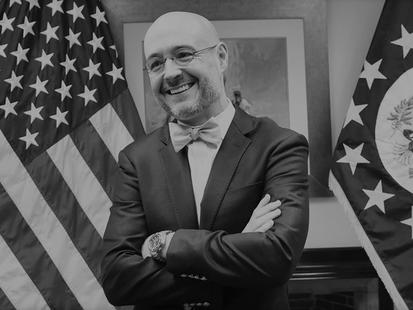
Hugo Rodriguez
MBA ’92, Chargé d’Affaires, U.S. Embassy in Paraguay
Industry
Hugo Rodriguez (MBA ’92) leads a team of 320 individuals as the Chargé d’Affaires at the U.S. Embassy in Paraguay. Rodriguez and his wife, Karen, also a U.S. Foreign Service officer, and their two daughters moved to Asunción from Mexico City, where Rodriguez served as consul general and acting minister counselor for consular affairs beginning in 2014. He has also served at U.S. missions in Lima, Rome and Baghdad since joining the State Department in 2000.
What were your early years like?
My dad was a doctor in the Philadelphia suburbs, but his hobby — his passion, really — was agriculture, so I grew up on a small farm in southeastern Pennsylvania. I am one of six kids, and the expectation was always that we would seek professional careers beyond the farm, but it was an idyllic way to grow up. We were surrounded by animals and had miles of fields and woods to explore and enjoy.
Could you share a favorite memory or moment of growth from your time at Darden?
Unsurprisingly in my job, I rely most heavily on the lessons I learned in Organizational Behavior and Negotiations, but one of my favorite things about the Darden faculty was their flexibility. What other business school would let you sign up for a creative writing class (in one of the best programs in the country) instead of taking business writing? I am also grateful to one of my classmates, Steffen Lauster (MBA ’92), for encouraging me to start running. I haven’t really stopped in 26 years!
When did you discover your passion for diplomacy and how has earning a Darden MBA played a role in your career progression?
After Darden, I went to work for Dole Fresh Fruit International, first in Colombia and then in Honduras. Darden prepared me to be successful at work — to understand the needs of the enterprise and lead teams to accomplish what was necessary — but it turned out I was also able to adapt quickly to different cultural contexts and be effective in challenging environments. What attracted me to diplomacy was the chance to put my operational abilities and cultural adaptability in the service of the country. From my first day doing visa interviews as a newly minted U.S. Foreign Service officer, I felt connected to a larger purpose, and that feeling has grown over the past 17 years.
What has the move from Mexico City to Asuncion been like? Any surprises or lessons learned along the way?
Mexico City and Asunción are about as different as two cities in the same hemisphere can be, but both have their charms. My responsibilities are likewise very different. In Mexico, I was responsible for consular operations covering 10 locations and 750 employees spread around the country. As Chargé d’Affaires for the U.S. embassy in Asunción, I lead a team of 320 — from a variety of U.S. government agencies and offices — most of whom are co-located on the embassy compound. In Mexico, my job was operational and inward-looking, keeping everyone focused on progress toward our objectives. In Asunción, I am also the face of the embassy, representing the U.S. to the government of Paraguay, the business community, the media and civil society.
What kind of impact do you aim to make through your work? What does success look like to you?
I have two overarching goals. The first is to further U.S. foreign policy objectives — generally speaking, creating relationships with partner nations that protect American interests while promoting the values like rule of law and respect for human rights that make for strong, productive partnerships. My second objective is developing my people and connecting them to the mission. What we do is challenging even under optimal conditions, and we ask a lot of our teams, whether they are the U.S. Foreign Service officers or our talented local staff. I want to make sure they are prepared, engaged and excited about tackling the challenges we face.
How do you manage a global career and work-life balance? Do they complement one another?
I think we all struggle with this throughout our careers. I love what I do, so I’ll admit that my ‘balance’ has generally skewed toward the work end. However, in my current role as Chargé, I have been better about setting aside time to recharge and stay connected with my family. I urge my employees to do the same, and I think it’s easier for them to take that advice when they see me practice what I preach. I really believe we are more creative, flexible and resilient if we unplug regularly. Running and non-work reading are key for me.
Who would you most want to thank for your success?
I have had great role models and mentors throughout my life, starting with my parents, but I owe the deepest thanks to my wife, Karen. It’s a cliché, but she knows me better than I know myself, and her advice is invariably spot-on. She has always encouraged me to take on the big challenges, and even though she works as hard in her career as I do in mine, she somehow finds the time to make my burden lighter. I could not imagine a better partner.
What advice would you give to future global leaders?
Two things: First, be humble. It is ok to make mistakes and to admit you don’t know everything. Ask lots of questions! Second, your ability to succeed in your mission rests with your people. Invest in them. Take the time to build a bond of trust with them. Help them understand the importance of what the team is undertaking, and then turn them loose with the knowledge you are there if they need resources, guidance or support. Offer lots of encouragement and freely forgive errors — that’s how people learn.